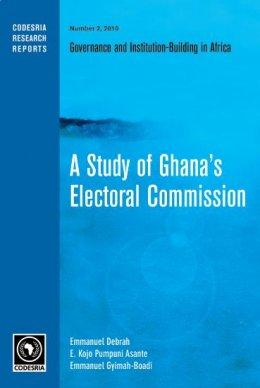A Study of Ghana’s Electoral Comission
Mots-clés :
Commission électorale, Étude, democratique, GhanaSynopsis
This report on the Electoral Commission (EC) of Ghana is part of a broader project on Modelling Success: Governance and Institution-building in West Africa, being implemented by the Consortium for Development Partnerships (CDP) , a community of institutions dedicated to collaborative policy-oriented research and capacity-building in North America, Europe and West Africa. The first phase of the project was jointly coordinated by the Council for the Development of Social Science Research in Africa (CODESRIA) and the Programme of African Studies (PAS), Northwestern University , Evanston, USA (2004-2008). The second phase (2008-2012), which is ongoing, is under the coordination of CODESRIA and the African Studies Center, Leiden, The Netherlands. The project focuses on the identification of concrete strategies to advance institutional performance in Africa. Studies sponsored under the project undertake in-depth analysis of institutions which are key to ensuring that governments and public officials act in the public interest.
Since the beginning of the post-1990 democratic reforms, studies that assessed governance institutions in Africa, and Ghana in particular, revealed poor performance due to weak systems and lack of credibility. In addition, the discourse on governance revealed a multiplicity of non-performing and under-performing institutions. This situation led to a deficit in knowledge about the true abilities of such national and regional institutions. A typical example is the Electoral Commission (EC) of Ghana, as it was not given any staid attention in the study of governance institutions in the country. Ironically however, the EC which evolved as part of the transfer of the superstructure of British colonial rule, with limited responsibility and jurisdiction, has grown over the years to enjoy the confidence and cooperation of the Ghanaian elite. Its high level of competence, efficiency and the ability to withstand negative influences and manipulations, have won it wide acknowledgement as an independent body with the capacity to hold free, fair and credible elections.
This report demonstrates that there are governance institutions in Africa that perform creditably well. It is therefore a very important report that all individuals and institutions committed to good governance, transparency, accountability, and credible elections and electoral processes in Africa will find very useful.
Téléchargements
Références
Apter, D., 1963, Ghana in Transition, Athenaeum, New York.
Austin, D., 1964, Politics in Ghana, 1946-1960, Oxford University Press, London.
Ayee, J. R.A. (ed.), 1998, The 1996 General Elections and Democratic Consolidation in Ghana, Accra: Department of Political Science.
Bennis, W. 1998, On Becoming a Leader. London: Arrow.
Bratton, M. and van de Walle, N. 1997, Democratic Experiments in Africa: Regime Transitions in Comparative Perspective, Cambridge, Cambridge University Press.
Bratton, M., 1999, “Second Elections in Africa”’, in L. Diamond and M.F Plattner (eds.) Democratization in Africa. Baltimore and London: The John Hopkins University Press.
CDD, 1999, Survey on Attitudes to Democracy and Market Reforms in Ghana, Accra: CDD.
CDD, 2002, The Growth of Democracy in Ghana Despite Economic Dissatisfaction: A Power Alterative Bonus?, Accra: CDD.
CDD, 2005, Ghana: Democratic Sustenance and Economic Stagnation?, Accra: CDD.
Chazan, N., and Le Vine, V., 1997, “Politics in a Non-political System: The March 30, 1978 Referendum in Ghana”, African Studies Review, Vol.
XXII, No. 1.
Debrah, E., 2004, “The Electoral Process and the 2000 General Elections in Ghana”, in T. Lumumba-Kasongo (ed.), Liberal Democracy and its Critics in Africa: Political Dysfunction and the Struggle for Social Progress, London: Zed Books, pp. 125-148.
Debrah, E., 1998, Indices of Free and Fair Elections: A Performance Appraisal of Ghana’s Electoral Commission, 1993-1996, Unpublished M.Phil. Thesis, Department of Political Scie University of Ghana,nce, Legon, Accra.
Gyimah-Boadi E., 1999, “Institutionalizing Credible Elections in Ghana” in Schedler, A. et al (eds.), The Self-Restraining State Power and Accountability in New Democracies, Lynne Rienner, London.
Gyimah-Boadi, E., 1999, “Six Years of Constitutional Rule in Ghana: An Assessment and Prospect of the Executive and Legislature”, in Six Years of Constitutional Rule in Ghana, Accra: Friedrich Ebert Foundation and Ghana Academy of Arts and Sciences.
Jinadu, A., 1995 “Elections Administration in Africa: A Nigerian Case Study Under the Transition to Civil Rule”, in Adejumobi & Momoh (eds.) The Political Economy of Nigeria Under Military Rule: 1984-1993, Natprint,
Harare Joseph, R., 1999, “Africa, 1990-1997: From Abertura to Closure, in L Diamond & M. F. Plattner (eds.), Democratization in Africa, John Hopkins University Press, Baltimore & London.
Larvie, J. and Badu, K.A., 1996, Elections 96 in Ghana, Part 1, Accra: Goldtype Ltd. National Democratic Institute (NDI), 1996 Making Every Vote Count: Domestic Election Monitoring in Asia, NDI, Washington, D.C.
Monga, C., 1997, “Eight Problems with African Politics”, in Journal of Democracy, Vol. 8, No.3, pp.156-179






